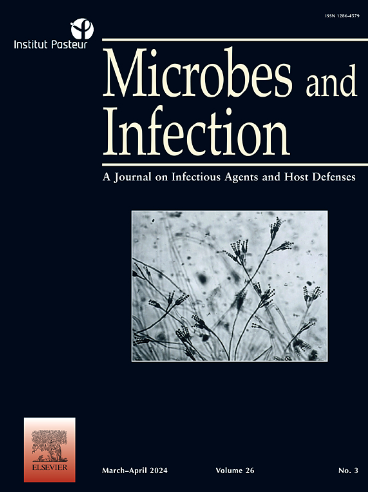Trypanosoma cruzi Vps34 colocalizes with Beclin1 and plays a role in parasite invasion of the host cell by modulating the expression of a sub-group of trans-sialidases
IF 2.6
4区 医学
Q3 IMMUNOLOGY
引用次数: 0
Abstract
Trypanosoma cruzi, the etiological agent of Chagas' disease, can infect both phagocytic and non-phagocytic cells. T. cruzi gp82 and gp90 are cell surface proteins belonging to Group II trans-sialidases known to be involved in host cell binding and invasion. Phosphatidylinositol kinases (PIK) are lipid kinases that phosphorylate phospholipids in their substrates or in themselves, regulating important cellular functions such as metabolism, cell cycle and survival. Vps34, a class III PIK, regulates autophagy, trimeric G-protein signaling, and the mTOR (mammalian Target of Rapamycin) nutrient-sensing pathway. The mammalian autophagy gene Beclin1 interacts to Vps34 forming Beclin 1–Vps34 complexes involved in autophagy and protein sorting. In T. cruzi epimastigotes, (a non-infective replicative form), TcVps34 has been related to morphological and functional changes associated to vesicular trafficking, osmoregulation and receptor-mediated endocytosis. We aimed to characterize the role of TcVps34 during invasion of HeLa cells by metacyclic (MT) forms. MTs overexpressing TcVps34 showed lower invasion rates compared to controls, whilst exhibiting a significant decrease in gp82 expression in the parasite surface. In addition, we showed that T. cruzi Beclin (TcBeclin1) colocalizes with TcVps34 in epimastigotes, thus suggesting the formation of complexes that may play conserved cellular roles already described for other eukaryotes.
克氏锥虫 Vps34 与 Beclin1 共定位,通过调节反式苷酸酶亚群的表达,在寄生虫入侵宿主细胞的过程中发挥作用。
南美锥虫病的病原体克鲁兹锥虫既能感染吞噬细胞,也能感染非吞噬细胞。克鲁兹锥虫的 gp82 和 gp90 是细胞表面蛋白,属于已知参与宿主细胞结合和入侵的第二类反式裂解酶。磷脂酰肌醇激酶(PIK)是一种脂质激酶,能使其底物或本身的磷脂磷酸化,从而调节新陈代谢、细胞周期和存活等重要的细胞功能。Vps34 是第三类 PIK,调节自噬、三聚 G 蛋白信号传导和 mTOR(哺乳动物雷帕霉素靶标)营养传感途径。哺乳动物的自噬基因 Beclin1 与 Vps34 相互作用,形成 Beclin 1-Vps34 复合物,参与自噬和蛋白质分拣。在 T. cruzi 表皮原虫(一种非感染性复制形式)中,TcVps34 与囊泡运输、渗透调节和受体介导的内吞相关的形态和功能变化有关。我们的目的是鉴定 TcVps34 在元clic(MT)形式入侵 HeLa 细胞过程中的作用。与对照组相比,过量表达 TcVps34 的 MT 侵袭率较低,同时寄生虫表面的 gp82 表达量显著减少。此外,我们还发现 T. cruzi Beclin(TcBeclin1)与 TcVps34 共同定位在表皮原虫中,这表明形成的复合物可能在其他真核生物中发挥保守的细胞作用。
本文章由计算机程序翻译,如有差异,请以英文原文为准。
求助全文
约1分钟内获得全文
求助全文
来源期刊

Microbes and Infection
医学-病毒学
CiteScore
12.60
自引率
1.70%
发文量
90
审稿时长
40 days
期刊介绍:
Microbes and Infection publishes 10 peer-reviewed issues per year in all fields of infection and immunity, covering the different levels of host-microbe interactions, and in particular:
the molecular biology and cell biology of the crosstalk between hosts (human and model organisms) and microbes (viruses, bacteria, parasites and fungi), including molecular virulence and evasion mechanisms.
the immune response to infection, including pathogenesis and host susceptibility.
emerging human infectious diseases.
systems immunology.
molecular epidemiology/genetics of host pathogen interactions.
microbiota and host "interactions".
vaccine development, including novel strategies and adjuvants.
Clinical studies, accounts of clinical trials and biomarker studies in infectious diseases are within the scope of the journal.
Microbes and Infection publishes articles on human pathogens or pathogens of model systems. However, articles on other microbes can be published if they contribute to our understanding of basic mechanisms of host-pathogen interactions. Purely descriptive and preliminary studies are discouraged.
 求助内容:
求助内容: 应助结果提醒方式:
应助结果提醒方式:


